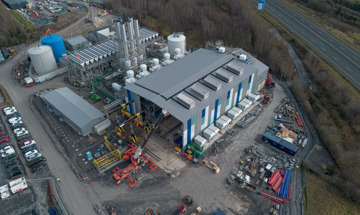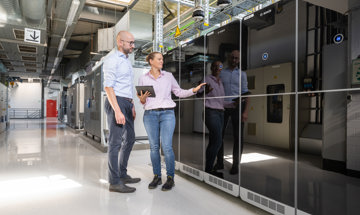New report from the Future Energy Skills Programme – led jointly by Centrica and the GMB Trade Union – calls for bold action to reform the UK’s skills system and create the workforce needed to reach net zero by 2050
The list of 48 practical recommendations includes:
- Measuring and rewarding schools for sending students down a vocational route as well as to universities.
- Reintroducing formal industry experience within the secondary curriculum.
- Running public information campaigns on the value of apprenticeships as a route into a career.
- Recognising home energy efficiency roles as essential and skilled professions.
- Download the report(PDF – 16.5mb)
"Meeting the UK’s energy ambitions requires bold action, and we must move with urgency to create the next generation of well paid, skilled jobs while ensuring that no worker or community is left behind on the path to a greener future."
Chris O’Shea, Group Chief Executive of Centrica
Technical and vocational training provision must be completely overhauled if the UK is to meet its net zero obligations, according to a new report from a group of leading voices from business, trade unions and academia that lays out key priorities for achieving an independent and carbon-free future for the country.
The Skills for a Jobs Transition report from the Future Energy Skills Programme – which is co-headed by Centrica CEO Chris O’Shea and Gary Smith, GMB General Secretary – provides a 50-point plan designed to create the skills and careers the UK needs as it accelerates towards energy independence, while ensuring a fair and inclusive transition for the workforce of today. The report was produced with submissions gathered from parties including the Climate Change Committee, National Grid, Energy Systems Catapult, JCB, Rolls-Royce and the Association of Colleges.
"The UK must transform our skills agenda, from the classroom to the frontline of energy delivery, to secure a successful climate jobs transition to net zero."
Gary Smith, General Secretary at GMB
The document calls for a properly funded and more flexible education system that will allow new qualifications to be developed around emerging low-carbon technologies and sets out the need to destigmatise vocational training – particularly apprenticeships – to improve the status of green skills.
The report makes the case that the path to net zero requires a fair jobs transition in which no jobs are lost but are repurposed or retrained.
The Future Energy Skills Programme also call for clearer government strategy on hydrogen, home heating, small nuclear, and carbon capture utilisation and storage.
Gary Smith, General Secretary at GMB, said: “The UK must transform our skills agenda, from the classroom to the frontline of energy delivery, to secure a successful climate jobs transition to net zero.
“The scale of the challenge is clear, and the price of failure is staring us in the face with the offshoring of hundreds of thousands of good jobs and tens of billions of pounds in investment over the next generation to the rest of the world.
“To win a better future we need an active and supportive state working around the table with employers, educators, and unions.
“This is a timely and far-sighted report, offering just the sort of credible proposals our country needs to turn aspiration into delivery.”
Chris O’Shea, Group Chief Executive of Centrica, said: “Across political parties, industry and society there is now a consensus for the move towards net zero – but our ability to get there, and to do it in a way that is fair and affordable to everyone, needs to be examined.
“An ageing workforce, lack of apprentices, inadequate and inflexible vocational training, and a lack of diversity in the energy industry are just some of the challenges standing in the way.
“Meeting the UK’s energy ambitions requires bold action, and we must move with urgency to create the next generation of well paid, skilled jobs while ensuring that no worker or community is left behind on the path to a greener future.”
The report was produced with submissions gathered from parties including the Climate Change Committee, National Grid, Energy Systems Catapult, JCB, Rolls-Royce and the Association of Colleges.
NOTES
About the Future Energy Skills Programme
The Future Energy Skills Programme has been created to identify and address the skills, knowledge and capabilities needed within the energy sector for the UK to achieve net zero by 2050.
The programme, whose representatives together employ or represent more than 6 million British workers, includes Centrica, GMB, Equinor, Rolls-Royce, National Grid, Daiken, the TUC, University of Strathclyde Centre for Energy Policy, Arden Strategies, Offshore Energies UK, JCB, Prospect, Unison and Unite.
The Programme will consider how to unlock the skills required in the energy sector by focusing on two key themes. First, how to create careers for the future as the UK accelerates plans for energy independence. Second, how to ensure a fair and inclusive transition for the UK’s existing high carbon workforce as part of our pursuit of net zero.
Summary of policy recommendations in The Skills for a Jobs Transition
Strategic recommendations:
- Government should expand the ambition of its green investment to match the scale of plans recently set out by the United States, European Union nations and other G7 peers.
- High carbon industries should prepare ‘Just Transition Agreements’ with their workforce.
- We call for large scale public investment in decarbonising homes, including free installation for low-income households and subsidised loans for heat pumps or hydrogen boilers.
- We call for a clear, committed policy roadmap for heat and buildings all the way through to 2050.
- Bring forward, to sooner than 2028, the requirement that all newly installed gas boilers be accompanied by an electrical heat generation element or other low carbon technologies, including hydrogen.
- Begin a government-backed public information campaign on energy saving measures.
- We call for a new approach to home energy efficiency programmes, that recognise this as an essential and skilled profession.
- We would support introducing tax incentives for investment in low-carbon technologies, which would stimulate investment and create new jobs.
- Introducing long-term contracts for low-carbon energy, such as power purchase agreements, to provide investors with greater certainty over revenue streams.
- Government should consider introducing a low-carbon procurement policy, which would require public sector organisations to purchase low-carbon goods and services, creating a market for green technologies.
- There is a need for a new strategic body for the energy sector, bringing together employers, workers, education, and government at every level, to oversee a skills strategy and to monitor skills needs.
- Ofgem’s regulatory role should also be enhanced to become more long-term in focus and to encourage skills development.
- If it is to be successful and, crucially, to create political consensus, all planning of transition pathways to Net Zero must involve workers’ representatives.
- The UK should make the commitment to low carbon technologies, including hydrogen, and offer the incentives that will enable us to undergo a rapid transformation to decarbonised gas supply.
- The UK Government should keep to its published timetable to down-select SMR technology by the end of the year, with a clear path to deployment.
- Reforming the Development Consent Order process for nationally significant infrastructure projects through reducing planning regulatory burdens to reduce the cost and time of the planning process.
- We urgently need much more robust data collection to understand how the renewable energy industry is performing and evolving across the UK. This will support transparency and accountability for government and industry economic and environmental targets.
- Industry must share their projected workforce needs as early as possible through the 2021 DESNZ supply chain questionnaire. All those undertaking major projects in a nation or region should have to share their new project workforce needs as accurately as possible.
Skills recommendations:
- Governments across the United Kingdom should undertake a full funding review of universities, FE and apprenticeships with a view to reapportioning monies to meet this historic challenge.
- We need to focus on linking skills provision to real jobs. Difficult decisions need to be made on prioritisation and substitution.
- Reform of the apprenticeship levy to allow for modular apprenticeships and standard frameworks would ensure apprenticeships could be tailored according to a business’ need.
- Existing funding arrangements do include the provision for any industry certifications within the specific apprenticeship programme, they do not extend to the payment of additional training certifications that exist within industry, which could be a natural extension of the current level of apprenticeship that a learner is enrolled upon.
- To meet demand, the Low Carbon Heating Technician apprenticeship standard needs to be finalised by the Institute of Apprenticeships & Technical Education as quickly as possible.
- We would support an alternative recognised pathway into a competence scheme or qualification for existing gas engineers to be able to transfer their skills into the newer technologies such as heat pumps.
- Minimum technical competencies for heat pump design, installation, commissioning, and handover should be incorporated into training and requirements for plumbing and heating engineers. Supported by a competent persons scheme or green skills card for installers of low-carbon technologies, similar to Gas Safe accreditation.
- Apprenticeship development should take no more than a year from identification of need to delivery of qualification certification.
- Greater devolution of skills budgets would allow local authorities and/or devolved administrations to better match skills support to geographical factors.
- Governments should commit to a national retraining programme/s which equip existing carbon-intensive workers, and new workers in areas where carbon-intensive industries are concentrated, with low carbon skill sets.
- We need an approach which focuses investment in industry and skills in low carbon energy technologies, as we cannot assume the market will place new jobs where the old ones were.
- We need government to offer financing options for modular training and upskilling to redeploy those currently in high-carbon sectors towards lower carbon technologies.
- Barriers to retraining need to be removed with innovative approaches trailed such as training sabbatical or paid time off to train in green skills.
- Governments should be developing training centres for green jobs in areas at risk of dislocation and include those former coalfield areas and other communities with displaced industries.
- Currently there are no uplifts in funding for apprentices from areas of multiple deprivation, consideration should be given to exploring uplifts in areas of potential dislocation as we move towards net zero.
- Just transition agreements should be encouraged, following the model between employers and unions around the closure of the Cottam coal power station.
- The UK should provide equivalent funding to the EU’s just transition fund to help communities diversify and develop alternative industries.
- Industry needs to ensure mutual recognition of training certification and supply chain standards across sectors to ease transfer of workers between.
- There should be skills ‘passporting’ for the offshore oil and offshore wind sectors
- We would like to see a careers map from DESNZ in conjunction with the Department for Work and Pensions so that careers advisors in schools can aptly describe green related careers to pupils.
- Government and industry should work together to create resources that connect the world of learning with future jobs.
- Reintroduce formal industry experience within the secondary curriculum. A new approach is required, which could include longer placements perhaps over several terms or years and industry-related coursework.
- To improve the diversity of those entering green jobs through the STEM route ambassadors from a range of backgrounds could inspire such pupils and bring the possibility of working in green energy related careers to life.
- Colleges need to create a sense of excitement and increased level of knowledge around the opportunities of jobs in renewable energy, not just so that young people can set themselves on that course, but so that carbon-literate young workers can act as advocates within the existing workforce.
- Schools need to be monitored, measured and rewarded for sending young people down a vocational route as well as to universities.
- There should be a public information campaign on the value of, and opportunities arising from, the apprenticeship route to a career.
- Moving individuals from older workforces into skills teaching is a strategy used in other countries where the link between employers and skills delivery is stronger. It is worth piloting as a potential way to better utilise the skills and experience of older workers that may soon be lost to the economy.
- The principle for policymakers should be ensuring a transition that avoids job losses rather than mitigating them after the fact.
- For the apprentice system to cope with this increased demand, it needs to be funded correctly in line with the increasing demand for this option.
- All parties should engage in this debate in a way that encourages consensus that will, in turn, create the market certainty that industry needs to rise to the investment challenge.
About Centrica
Centrica is an international energy services and solutions company, founded on a 200-year heritage of serving customers in homes and businesses. We supply energy and services to over 10 million residential and business customers, mainly in the UK and Ireland, through brands such as British Gas, Bord Gáis Energy and Centrica Business Solutions. Through our trusted brands, we deliver innovative energy and services solutions to help solve customers’ needs, supported by around 7,000 engineers and technicians. We are committed to creating a cleaner and greener future.

News
Centrica expansion in the Irish power market

News
Centrica signs Brazilian LNG supply agreement

News
Centrica concludes triennial pension schemes review

News
Centrica, Bosch and Ceres launch whitepaper around the role of hydrogen in decarbonising the UK
Sustainability

News
Centrica and Coterra Energy announce natural gas sale and purchase agreements

News
Team GB and ParalympicsGB Athletes Find New Career Pathway at Centrica
Our people
